- Home
- James Thurber
The Wonderful O
The Wonderful O Read online
PENGUIN BOOKS
An imprint of Penguin Random House LLC
375 Hudson Street
New York, New York 10014
penguin.com
First published in the United States of America by Simon & Schuster 1957
This edition with an introduction by Ransom Riggs published in Penguin Books 2017
Copyright © 1957 by James Thurber
Introduction copyright © 2017 by Ransom Riggs
Penguin supports copyright. Copyright fuels creativity, encourages diverse voices, promotes free speech, and creates a vibrant culture. Thank you for buying an authorized edition of this book and for complying with copyright laws by not reproducing, scanning, or distributing any part of it in any form without permission. You are supporting writers and allowing Penguin to continue to publish books for every reader.
ISBN 9780143130420 (paperback)
ISBN 9781524705138 (e-book)
Cover design and illustration by Marc Simont
Version_1
For Ted Gardiner
and his Julias and Patricias,
with love and other good O words.
Contents
Title Page
Copyright
Dedication
Introduction by RANSOM RIGGS
The Wonderful O
Introduction
Before I tell you about James Thurber, I have to tell you about my grandmother. Ga, as we called her, will go down in family history as the brightest Riggs there ever was, and surely the brainiest person in the little farming town where we lived, where people could while away afternoons talking about soil and hogs and the price of soybeans. She was a farmer’s daughter who graduated in the top of her class from the University of Chicago, and later a farmer’s wife who, when she wasn’t milking cows or gelding pigs, taught Latin and French at a famous girls’ prep school. She was a militant grammarian who loved language and devoured books, but her own four sons didn’t care much for them—with the exception of my father, who was hampered by dyslexia all his life. When I came along, she was determined to infect me with her love of reading —if only to have a family member who shared her passion—and she did it by reading me James Thurber.
Thurber was one of her favorite writers, and there was no writer she’d reach for faster when reading aloud to me. Thurber’s stories for children were a treat for the ear, full of puns and playful, looping language, and I can still hear my grandmother reading those silly tales in her steady, serious voice—The Wonderful O in particular—while stopping here and there to laugh or shake her head or go hm, hm, hm to herself in mild wonderment. I never quite grasped what she was hm-ing about, or why she laughed at parts that didn’t seem funny to me; it was as if we were hearing two different stories.
Years later, when I rediscovered Thurber among my grandmother’s collection of yellowing paperbacks, I reread The Wonderful O and realized that, in fact, we were hearing two different stories, layered together in the same pages. Thurber was not only a master of wordplay and rhyme, but of allegory, too, which was the reason Ga could stand reading The Wonderful O over and over again. He had written a story that could be enjoyed and understood differently by her and me, two people with seventy years separating them, and that is one of the most difficult tricks a fiction writer can pull off.
As a seven-year-old, I loved how Thurber teased out the problem of what it would be like to live in a world without the letter O, and all the trouble that might cause. It was, on its face, about the most absurd premise you could invent, one that might contain some lessons about letters and language but none about life or the world. At thirty-five, though, reading the book for the first time as an adult, I realized that it was much more than that. It’s a brilliant satire, a bold polemic encased in a fairy tale. What seems at first mild, even childish, is at heart an angry book, a political book, and a book very much of the twentieth century. It was a brilliant thing to write O as a children’s story, which frees it from the boggy details of specific political debates, and more brilliant still to write it as a fairy tale, which cloaks in timelessness a story that is very much of its time, written as it was in the middle of the twentieth century, during the height of the Cold War, by a man of keen intelligence and strong opinions.
It is a story about dictators who outlaw a letter of the alphabet, then proceed to go about smashing and banishing all things that include it, jailing those who resist. It’s a testament to the power of allegory that the same story can seem light and silly to a child but quite the opposite to an adult—especially an adult in the late 1950s, who could open any newspaper and find stories about dictators banning and burning books, purging their societies of intellectuals, and attempting, via brutality and repression, to kill ideas. Laws that enforce ignorance and punish curiosity have long been an autocrat’s sharpest tool, and Thurber’s story merely takes this to an extreme—one that, once you strip away its fairy tale–ness, is not all that absurd. As the poet Geoffrey Hill wrote: “One of the things the tyrant most cunningly engineers is the gross oversimplification of language.” Removing a letter from the alphabet is the simplest oversimplification imaginable.
The Wonderful O, then, is a fairy tale in the classic tradition: a dire warning about dark forces in the world and the catastrophic consequences that can result from running afoul of them. I think that’s why, at storytime, my serious, progressive grandmother reached for this book before all others. It’s much more than just a clever yarn about how vowels work, but a story about repression and intellectual freedom and the sacredness of ideas; an impassioned political statement disguised as a children’s story. When I understood that, I understood my grandmother better—and Thurber, too. Both were misunderstood; neither were quite what they seemed.
My grandmother was a stern and dignified lady, and it was easy to assume, upon first meeting her, that she had never told nor laughed at a joke in her life. In fact, she had a razor-sharp sense of humor, but her jokes were so dry and delivered with such flatness that they were camouflaged, and you could catch them only if you were really smart and really listening. The inverse was true of Thurber; most people assumed he was always joking, and he was often praised as a humorist but dismissed as unserious in the same breath. But many of our best and most serious writers have also been our funniest. Like Mark Twain, Thurber knew that people did not want to be sermonized at or lectured to, and that people’s ears close the moment they detect a lesson lurking in their fiction. The best way to talk about serious things is often to laugh about them. “Humor in a living culture must not be put away with the flag,” Thurber wrote near the end of his life. “Every time is a time for comedy in a world of tension that would languish without it.”
So: the book you hold now is really two. It’s a dark book and a light one, an angry book and a hopeful one, a frightening book and a funny one. It’s a perfect book for children and one every thinking adult should read. It’s a timeless story that can be read as a commentary on world affairs a half century ago, but which feels absolutely (and sadly) relevant today. While balancing all that, which on its own is more than enough to earn The Wonderful O a place in the pantheon of the best children’s stories, it accomplishes feat after feat of linguistic acrobatics—not quite poetry, not quite prose, O is ear candy. Only a master working at the height of his powers could have written something that is so many things at once but which seems so simple on first approach. I’m very glad to see this important book being reissued, and I hope that, like me, more kids will grow up hearing this story at bedtime—and wondering what the adult reading it is hm, hm, hm-ing at.
RANSOM RIGGS
Somewhere a ponderous tower clock slowl
y dropped a dozen strokes into the gloom. Storm clouds rode low along the horizon, and no moon shone. Only a melancholy chorus of frogs broke the soundlessness. Then a strange figure appeared out of the nocturnal somnolence, as unexpectedly as the blare of a bugle in a lullaby. He entered the tavern near the sea, and a blade of light flashed into the blackness and disappeared when the old oaken door closed once more.
The newcomer was a seafaring man, and the sight of him turned the taverners silent. There was a green parrot on the man’s shoulder, and a tarred pigtail hung down his back. He carried no crutch, for he had two legs, and he rolled like a goose when he walked. His voice when he spoke was as deep as a gong in a tomb.
“Call me Littlejack!” he roared, and the taverners called him Littlejack.
A lean, silent man at a shadowy table in a corner, wearing a black cape and black gloves, beckoned to the newcomer, who sat down across from him. “You look like a man with a map,” whispered the man in black.
“I am a man with a map,” boomed Littlejack. “It is a map of a far and lonely island, rich with jewels, sapphires, emeralds, and rubies. I seek a man with a ship.”
“I am a man with a ship,” said the man in black.
“And a crew to man her?”
“And a crew to man her.”
“Are you a man with a name?” asked Littlejack.
“I am a man named Black,” said the man named Black. They shook hands, one heavy and bare, the other thin and gloved, and reached a bargain at one o’clock: “Two-thirds of the booty for me and you, the other third will go to the crew.”
Black smiled, and when he smiled he showed his lower teeth. “Now let me see the map,” he said. And he took the map and studied it. “There are no crosses here,” said Black, “or marks. There should be crosses here and marks, indicating where the jewels lie hidden.”
“There is another map with marks and crosses, but what became of it and where it is, no man can say,” said Littlejack.
“We’ll find the map, or if we don’t, we’ll find the jewels without it,” Black declared. He gazed at Littlejack as if the sailor were a jigsaw puzzle that had too many parts, or not enough. “You have the mien and manner of a man out of the past. Where do you come from?”
The sailor grinned. “Not, matey, from the regions which are wholly land. I’ll take the map.”
“It’s safe with me,” said Black.
“It’s safer if we cut the thing in two,” said Littlejack. And with his cutlass he cut the map in two. And Black took half of it and Littlejack the other half.
They went aboard the ship at two o’clock. “I can’t make out her name,” said Littlejack. “How is she called?”
“The Aeiu,” said Black.
“A weird, uncanny name,” the sailor said. “It sounds a little like a night bird screaming.”
“It’s all the vowels except the O,” Black said. “I’ve had a hatred of that letter ever since the night my mother became wedged in a porthole. We couldn’t pull her in and so we had to push her out.” He shuddered and his eyes turned hard. “What is the name of this island?” he asked, shaking off the thought of O.
“Ooroo,” said Littlejack, and once more the other shuddered.
“I hate the name,” he said at last. “It sounds like the eyes of a couple of ghosts leaning against an R. I speak O-words myself, so I can spit them out.” Something screamed. “A night bird,” whispered Black. “The sailors say it’s my mother. Let’s go below. I’ve got a cabin full of rum.”
When the dawn came up the Aeiu, whose sails were black as raven wings, could no longer be seen from shore, even by the sharpest eye and strongest glass. The weather was fair and the voyage was long. Then early one morning the ship came into the only port of the far and lonely island, and Black and Littlejack went ashore, the former softly, and the latter swaggering, followed by their surly and sinewy crew.
“We have come for your jewels,” Black told a spokesman of the quiet people, “with cutlasses and pistols.”
“With axes and spades and cudgels,” said Littlejack.
“We have no jewels,” said the spokesman, “except the blue of the water, and the pink of our maidens’ cheeks and lips, and the green of our fields.”
“We have come for your jewels,” repeated Black.
“We have only moonstones and opals, and other ordinary stones,” the spokesman said.
“Ordinary stones, ordinary stones!” squawked the green parrot.
“There is a map,” said Black, “a secret map, with marks and crosses, indicating where the jewels lie hidden.”
“I know of no such map,” the spokesman said.
Black grinned and showed his lower teeth again. “Take the town apart,” he cried, and the crew began taking the town apart, with axes and spades and cudgels, smashing the locks off doors, prying the lids from boxes, breaking into closets and cupboards, but all they found was moonstones and opals and other ordinary stones, lockets and lovenotes, options, contracts, mortgages, records, reports, and other documents, but neither precious stones nor any map.
“Dig in the woods,” commanded Black.
“Dig in the meadows,” ordered Littlejack. And the crew dug in the woods and in the meadows, but all they found was owls in oaks, moss and moles, toads and toadstools, roots and rocks.
“Drain the brooks,” snarled Black.
“Drain the pools,” roared Littlejack. And the crew drained the brooks and the pools, but all they found was trout and tortoises, frogs and worms, and an owl that had drowned in a pool.
“Owls in oaks, owls in pools!” squawked the parrot. The crew then turned to towers and fountains with their axes and cudgels, but all they got for their sweat and pains was the stones that towers are built of, and the sparkle of fountain water.
That night Black and Littlejack sat at a table in a tavern, drinking rum from tankards. “There must be sapphires,” whispered Black.
“And emeralds and rubies,” grumbled Littlejack.
“Opals and moonstones,” squawked the parrot. “Lovenotes, lockets, options. Owls in oaks, moss and moles, and mortgages.”
“Stop his squawking,” Black exclaimed, “or else I’ll squck his thrug till all he can whupple is geep.”
“All he can whupple is geep, all he can whupple is geep,” squawked the parrot.
“Still, I’m glad he named the things we found,” said Black, after a moment. “Everything we find has an O in its name, and everywhere we look has an O in its name, and everything we open—closets, cupboards, woods, meadows.”
“Floors and roofs,” added Littlejack, “and brooks and pools.”
Black stared into his tankard, while the tavern clock ticked sixty times. “I hate things with an O in their names,” cried Black. “That goes for clocks and parrots.” He threw his tankard at the clock and broke it open, but there was nothing inside but works, no rubies, no emeralds, and no sapphires, and no map.
“The parrot’s name’s Magraw,” said Littlejack. “There ain’t no O in that.”
“Squck his thrug,” squawked the parrot. “Squck his thrug.”
“And there ain’t no O in that,” said Littlejack.
Black stood up and smote the table with his fist. “I’ll get rid of O, in upper case and lower,” cried the man in black. “I’ll issue an edict. All words in books or signs with an O in them shall have the O erased or painted out. We’ll print new books and paint new signs without an O in them.”
And so the locksmith became a lcksmith, and the bootmaker a btmaker, and people whispered like conspirators when they said the names. Love’s Labour’s Lost and Mother Goose flattened out like a pricked balloon. Books were bks and Robinhood was Rbinhd. Little Goody Two Shoes lost her O’s and so did Goldilocks, and the former became a whisper, and the latter sounded like a key jiggled in a lck. It was impossible to read “cockadoodle
doo” aloud, and parents gave up reading to their children, and some gave up reading altogether, and the search for the precious jewels went on.
The afternoon after the night at the tavern, while O’s were being taken out of books and out of signs, so that the cw jumped over the mn, and the dish ran away with the spn, and the clockshop became a clckshp, the toymaker a tymaker, Black issued new searching orders. “Look in violins and cellos,” he commanded.
“Look in trombones, horns, and oboes,” thundered Littlejack. And the crew looked in violins and cellos, trombones, horns, and oboes, piccolos and banjos, finding nothing, for nothing came out of them except music.
That night in the tavern, after his thirteenth pint of rum, Black began to sing a ditty in a voice that had the timbre of a buzzard’s:
“I won’t go down the horrible street
To see the horrible people.
I’ll gladly climb the terrible stair
That leads to the terrible steeple
And the terrible bats, and the terrible rats,
And the cats in the terrible steeple.
But I won’t go down the horrible street
To see the horrible people.”
As he sang, the taverners stared at him and then they left their drinks unfinished, paid for them, and slunk away in to the night.
“Methinks the people have a loathing for your voice and for your song,” said Littlejack.
“I’ll take away from them,” said Black, “everything that plays and has an O.”
And so the following morning the crew went from house to house, seizing violins and cellos, trombones, horns and oboes, pianos, harpsichords, and clavichords, accordions and melodeons, bassoons and saxophones, and all the other instruments with O’s, up to and including the woodwinds. A man and his wife who loved to play duets on mandolin and glockenspiel drifted apart. Children, forbidden the use of combs, could no longer play tunes on combs with tissue paper. The crew spent the afternoon breaking up an old calliope they had found rusting in a field, and taking apart a carillon.

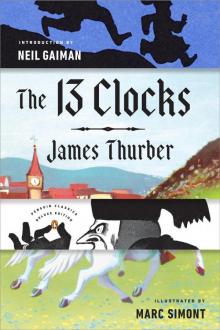 The 13 Clocks
The 13 Clocks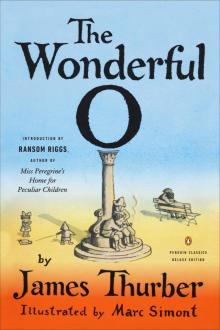 The Wonderful O
The Wonderful O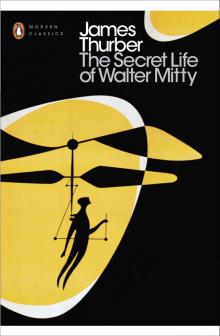 The Secret Life of Walter Mitty
The Secret Life of Walter Mitty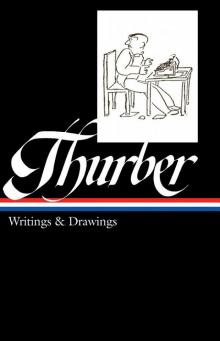 Writings and Drawings
Writings and Drawings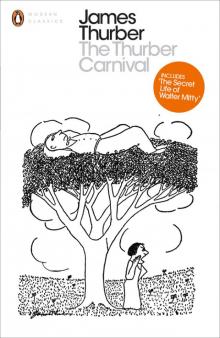 The Thurber Carnival
The Thurber Carnival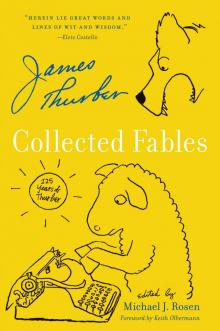 Collected Fables
Collected Fables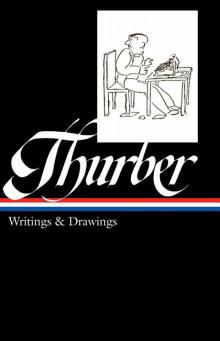 Thurber: Writings & Drawings
Thurber: Writings & Drawings